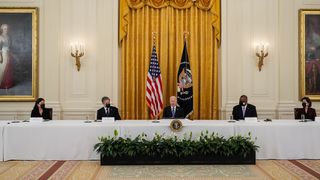Introduction
Joe Biden faced a tall order upon assuming the presidency. The United States was in the throes of a pandemic, unprecedented economic upheaval and was coming to grips with the first attack on the US Capitol in two centuries. Broadly, Biden’s task was to heal a wounded and divided nation, with a large proportion of the electorate seeing his election win as illegitimate, and his own supporters hungry for urgent and dramatic action on a range of issues spanning pandemic recovery to multilateral action on climate change.
Crossing the threshold of 100 days in office is not a formal marker, but it does give an important early indication of the priorities and governing style of a presidency. It was during Franklin Delano Roosevelt’s first months in office — in the depths of the Great Depression in 1933 — that the significance of an administration’s first hundred days became cemented in popular consciousness. Can the president take advantage of the “political honeymoon” afforded by coming to power at a time of crisis, and if so, how? Do the actions undertaken during this window build or deplete political capital? What does the governing style of the president portend for the remainder of his time in office? How is the administration being structured organisationally? Who is being appointed to what roles?
All of these “first 100 days” questions are especially relevant in the case of the Biden presidency, coming to power during the deepest crisis to confront the United States in decades, and seeking to implement the most consequential presidential agenda in generations.
This compilation seeks to introduce key Biden administration appointees and highlight their significance for Australia. Not every cabinet or senior staff member is included, our focus being on roles that are the most consequential for Australia and its national interests. The observations and analysis here provide insights into what may be expected in the next hundred days, and the 1,260 thereafter.
Executive summary
After 100 days of the Biden administration, it is abundantly clear this administration represents a significant departure from the Trump, Obama and Bush presidencies. Resounding proof of this can be found in Biden’s appointments for top-level cabinet positions and key advisory roles.
Diversity. Nearly 55 per cent of Biden’s cabinet is non-white and 45 per cent is female. The nomination of the most diverse cabinet in US history, a cabinet that “looks like America”, is an especially celebrated distinguishing feature of Biden’s first 100 days. Indeed, of the 15 members in this compilation alone, seven represent the first minority to ever hold their position – from the first Black American to lead the Pentagon, to the first female Secretary of Treasury.
Experience. Reviewing Biden’s appointments closely, several more observations can be made. Biden’s cabinet pieces together a ‘team of careerists’ – ambitious experts with stellar reputations for achievements at the top levels in academia, public service, law and the military. In fact, 14 of the 15 members covered here have previously served in a presidential administration, formerly occupying positions as advisors to the president and vice president, members of the National Economic Council and even secretary of state.
Several members also worked together to implement policy during the Obama years, including many who worked as advisors to Biden himself. This group is not only highly qualified, but well-known to each other and deeply trusted by President Biden. They are trusted to get the job done and to demonstrate commitment to the administration’s policy agenda.
A president’s cabinet and senior staff filled with highly capable Ivy League alumni is far from unique. Most administrations have countless Ivy Leaguers in senior roles. Forty-one per cent of Biden’s staff carry an Ivy League degree (compared with 21 per cent for all Trump’s aides). Yet what is notable about each of Biden’s appointees is not so much their unique (or controversial) postures on policy, their outsized personalities, or their loyalty to a particular brand of Democratic politics, but rather their professional accomplishments and broad experience. However, in contrast to President Obama’s ‘team of rivals’, this cohort generally tow moderate and compatible politics and personalities and, upon appointment, were largely praised for their expertise, graciousness and ability to work across the political spectrum.
What does all this mean? For one, it indicates the unique challenges presented by the Trump administration and pandemic have not only shifted the political priorities of senior government officials, but may have also shifted their approach to government. Seemingly unprecedented questions about the future of US democracy have likely crystallised a common goal and have helped minimise infighting in the early Biden administration.
By reviewing key players in the Biden administration, this compilation will not just summarise their accomplishments and apparent modus operandi, but analyse trends and priorities to provide targeted insights for Australian decision-makers.
|
Name |
Role |
Who are they? |
What should Australia know? |
|
Lloyd Austin |
Secretary of Defense |
The first Black American to lead the Defense Department and a former general with extensive experience in the Middle East. Austin led the US withdrawal from Iraq in 2011 (a process overseen by then-Vice President Biden) as well as efforts combatting ISIS later in the Obama administration. |
Biden faced Democratic criticism for choosing Austin. The fact the media-averse Austin was picked over Michèle Flournoy – widely seen to be the favourite for the position – is telling of what President Biden wants in his cabinet: lower profile officials more willing to allow their policy to be shaped by the administration. |
|
Antony Blinken |
Secretary of State |
The stepson of a Holocaust survivor often said to have ‘mind meld’ with Biden, Tony Blinken is a longtime Democratic foreign policy hand with decades of experience advising Biden. |
A Europhile at his core, Blinken is naturally transatlantic-oriented but has already proven he’s adapted to prioritise the Indo-Pacific. While a pragmatist on most foreign policy issues, Blinken is unafraid to address China’s action in Xinjiang as genocide and sees key issues – notably human rights and the ‘responsibility to protect’ - in deeply personal terms. |
|
Kurt Campbell |
National Security Council, Indo-Pacific Coordinator |
Perhaps the most well-known and accomplished Asia hand in the Democratic Party. As the chief architect of the Obama administration's ‘Asia pivot’, Campbell was brought back to fortify new blocs and existing alliances in Asia. |
Campbell will spare no effort in working with allies and partners to re-establish and expand upon a robust US presence in the Indo-Pacific. He is proactive in reassuring Australia of the strength of the US-Australian alliance in the face of an increasingly assertive China. |
|
Brian Deese |
Director, National Economic Council |
Renowned for both his youth and economic expertise on climate change, Reese was an economic advisor to President Obama and oversaw the 2009 auto industry bailout as well as the 2015 Paris Climate Accord (Paris Agreement). |
Deese will be the key figure for determining the economic policies underpinning the administration's ambitious climate agenda as well as the continued domestically-focused “Build Back Better” plan. |
|
Kathleen Hicks |
Deputy Secretary of Defense |
A leading and experienced thinker on US national security strategy, Hicks comes to her role after years in the Pentagon (and outside of it too) studying US military readiness. She’s a reliable spokesperson on the needs of a new and better resourced US military strategy in the wake of a rising China. |
Referring to China as the US foremost strategic competitor, Hicks will both push for military modernisation and technological development. She will be an indispensable partner of Australia as the United States fortifies their interoperability with allies in the Indo-Pacific. |
|
John Kerry |
Special Presidential Envoy for Climate Change |
Kerry is the sole exception to Biden's otherwise full rejection of the Obama-style ’team of rivals’ approach to the cabinet. He holds experience as the 2004 Democratic presidential candidate, nearly 30 years as a Massachusetts senator and was secretary of state during the Obama administration. |
The creation of the role of climate envoy highlights the importance of climate change to the Biden administration. Australia will likely continue to be directly criticised by Kerry for climate inaction - particularly around ‘insufficient’ climate ambitions and coal. |
|
Ron Klain |
Chief of Staff |
The most progressive of the numerous finalists considered for Biden's chief of staff, Klain is an old Biden staffer with direct expertise on public health and responding to economic crises. |
Klain will be focused on the operations of the White House and smoothing the passage of domestic legislation, including addressing any tensions with progressive Democrats. As the most prolific Twitter user of all Biden's top advisors, Klain provides helpful insights into the administration’s thinking. |
|
Gina Raimondo |
Secretary of Commerce |
A moderate Democratic governor famous for taking on her state’s labour unions, Raimondo reformed Rhode Island's state pension plan – much to the consternation of progressive Democrats. |
While Raimondo has little to no foreign policy experience, she will be key in implementing the Biden administration’s economic agenda. Her remit includes executing the administration’s continuation of the Trump administration’s tariffs on China, as well as a number of other countries that include US allies (though not Australia). |
|
Ely Ratner |
Special advisor to the Defense Secretary and China Task Force Director/ nominated to be Assistant Secretary of Defense for Indo-Pacific Security Affairs |
An internationally known, accomplished, and respected expert on US-China relations with years of experience advising Biden, Ratner refers to China as America’s foremost strategic rival and is an advocate for enhancing US competitiveness through military modernisation and technological advancement. |
Ratner’s appointment as Lloyd Austin’s chief advisor is seen as a reassuring sign for China hawks that the administration’s defense strategy will be robust and that multilateral efforts in the region will expand and deepen. Under his advice, military modernisation and a more coherent China strategy can be considered a priority for the Pentagon. |
|
Cecilia Rouse |
Chair, Council of Economic Advisors |
The first Black American in the role, Rouse is a labor economist and academic with a significant focus on inequality. |
As the head of the internal economic think tank of the White House, Rouse is a key media-facing presence on critical "Build Back Better" policies, the economic rationales for them, as well as the key indicators for whether they are deemed to be successful or not. |
|
Wendy Sherman |
Deputy Secretary of State |
A nuclear negotiation expert, Sherman was a key architect of the Iran Deal during the Obama administration as well as the Clinton administration’s negotiations with North Korea. |
Sherman will likely be entrusted to get Iran back to the negotiating table, but unlike during the Obama administration, she will not be given the same resources or political capital to do so given that the Indo-Pacific is the administration’s greater foreign policy priority. |
|
Jake Sullivan |
National Security Advisor |
A wunderkind of Democratic Party foreign policy who served Barack Obama and Hillary Clinton. The election of Donald Trump saw Sullivan become the chief evangelist of a foreign policy for the middle class (i.e. synthesising foreign and domestic policy). |
Best known for his role orchestrating the Obama administration's Iran Deal, Sullivan has quickly ramped up focus on Asia and increasing US competitiveness at home. Unlike many predecessors, he is seen as a team player averse to flaunting himself or his achievements. |
|
Katherine Tai |
United States Trade Representative (USTR) |
The first Asian-American in the role and the first Biden appointee to receive unanimous Senate approval. As a former USTR staffer under President Obama and later a trade counsel in the House Representatives, Tai has unmatched expertise in addressing trade issues with China. |
Tai comes with bipartisan respect and is a consensus builder. For now, the consensus in the Biden administration is that enforcement of existing trade agreements – and not new trade deals – are the priority for the administration. |
|
Linda Thomas-Greenfield |
US Ambassador to the United Nations |
With over 30 years of foreign service experience, Thomas-Greenfield is a highly respected former diplomat who even Mike Pompeo sought to bring back to the State Department. She is both proud and open about her Louisiana roots, including her experiences growing up in the segregated South. |
Unlike other US ambassadors to the UN who sought to use the position to bolster their own political careers, Thomas-Greenfield is expected to be a humble and loyal soldier staying on-message: America is once again a beacon of democracy, committed to human rights and the rule of international law. |
|
Janet Yellen |
Secretary of Treasury |
The first person in US history to head each of the most powerful federal economic bodies: the Treasury, the Federal Reserve, and White House Council of Economic Advisors. While the first female Treasury Secretary is very much an establishment figure, even as Chair of the Federal Reserve (a far more conservative and less political position), Yellen was notably progressive on issues like inequity and climate change. |
A well-known inflation dove, Yellen will also prioritise non-traditional issues like inequality, racial equity, and climate change for prominent roles in Treasury policy. She will also spearhead key global efforts by the Biden administration like a global minimum corporate tax. |
The briefing: Biden's Cabinet and advisors
Lloyd Austin: Secretary of Defense
The secretary of defense leads the Pentagon and advises the president on issues concerning military and international security policy.
Confirmed by Senate 93-2
“… he is a true and tested soldier and leader. I’ve spent countless hours with him, in the field and in the White House Situation Room. I’ve sought his advice, seen his command, and admired his calm and his character. He is the definition of a patriot” – President Joe Biden, 8 December 2020.
What have they done?
- Distinguished military career | Austin’s highly distinguished 41-year military career (1975-2016) earned him the rank of four-star general. He served in multiple deployments across the Middle East including the invasion of Iraq in 2003. Rising through the ranks after many distinguished achievements, he provided advice to the Obama administration on US-Iraq policy from 2010 and led the withdrawal of 150,000 troops from Iraq in 2011. In 2013, Gen. Austin was named commander of Central Command (CENTCOM) which saw him become the architect of the US-led campaign against Islamic State in 2014, and the US coalition in Syria in 2015.
- Obama’s Middle East mission | In 2010, Gen. Austin advised Obama to leave a small force of around 5,000 troops on the ground in Iraq, advice that some suggest may have prevented Islamic State resurgence in later years. During Obama’s Middle East campaign, Austin often had his advice disregarded and as such earned a reputation for following orders and managing the fallout of strategic mistakes that weren’t his own. In 2015, Austin famously appeared before a Senate committee regarding Operation Inherent Resolve where his shaky testimony raised doubt over Obama’s US$500 million train-and-equip program for Syrian rebels.
- Controversial selection | Austin’s appointment as secretary of defense required special dispensation from both chambers of Congress to waive a legal prohibition forbidding military officials to serve in the role less than seven years after active service. Austin was only retired for four years when nominated. Austin became recognised for his humble, measured and reserved character. Some commentators have credited him for maintaining a low profile and avoiding public-facing parts of his job of CENTCOM, arguing such an anonymous posture will help him approach US military strategy afresh under the Biden administration rather than tethering him to Obama-era policy.
- On China and Michele Flournoy | Austin has been criticised for having an insufficient understanding of China and US-China foreign policy strategy in terms of competing maritime power and military technologies. Michèle Flournoy, tipped to be secretary of defense before Austin’s more unexpected nomination, contrarily has a much stronger position on China with professional expertise on Chinese military modernisation. Unlike Austin, Flournoy also has a clearer public image of being hawkish on China, against which Austin is obviously a ‘safe choice’.
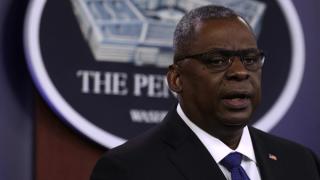
The first 100 days
- Withdrawal from Afghanistan | Austin has said that he wants a “responsible end” to the United States’ war in Afghanistan after raising concerns about the feasibility of the US meeting its May 1 withdrawal deadline. Speaking alongside NATO representatives in Brussels in April, Austin reassured Afghan security forces that the US would support them to prevent a resurgence in terror activity after the US withdrawal by 11 September 2021.
- Strengthening alliances | Like many other members of Biden’s foreign policy team, Austin has been tasked with reaffirming US alliances across the globe. Throughout March, Austin joined Secretary of State Anthony Blinken in a tour of several Asian nations including South Korea, Japan and India. He then toured the Middle East and European allies including Israel, Germany and the UK, as well as NATO leaders. Across each trip, strengthening cooperation to combat security threats was on the agenda – whether that meant conflict on the Sino-Indian border, territorialism in the South China Sea, instability in Jordan or Iran’s nuclearisation.
- Negotiating US presence in Syria | Austin’s Middle East expertise will be drawn on as Biden seeks to improve the efficacy of the lessened US military presence in Syria. Gen. Austin will work alongside Blinken in the determination of this policy which may see Austin’s military strategy complemented by greater diplomatic engagement and focus on the US moral imperatives to protect civilians. This orientation has already been seen on 25 February when Austin oversaw ordered airstrikes against Iranian-backed militia in Syria in response to their attack on civilians earlier in February.
- The war in Yemen and relations with Saudi Arabia | In February, the head of US CENTCOM, Gen. Kenneth McKenzie, confirmed that the US would continue to provide some defensive support to Saudi Arabian forces in Yemen. As pledged during Biden’s presidential campaign, the US has withdrawn support for Saudi offensives in Yemen. Before the release of the Khashoggi Report, Gen. Austin called the Saudi crown prince to reaffirm the US commitment to US-Saudi bilateral relations, despite the findings of the Report and reports of Saudi misconduct in the Yemeni war.
- Iran-Israel tension | As tit-for-tat tensions rose between Iran and Israel throughout April, Austin demonstrated support for Israel describing America’s commitment to the country as “enduring and ironclad”. Such statements were welcomed by Israel’s prime minister Netanyahu who has voiced concerns over the US renewed negotiations with Iran over its nuclear proliferation.
The next 100: Implications for Australia
Austin’s nomination makes little practical difference in the strong grip of the US-Australian military alliance. Shortly after his nomination, Austin spoke with former Australian Minister for Defence Linda Reynolds to confirm, what is termed, the ‘Unbreakable Alliance’ between Australia and the United States. Indeed, as much of his term so far has involved strengthening regional alliances in the Indo-Pacific, Middle East and Europe, it seems that US defence policy will focus on multilateral coalition building and lessening US involvement in the Middle East.
Antony Blinken: Secretary of State
The secretary of state directs and carries out US foreign policy and diplomatic efforts on behalf of the president. This includes the negotiation of treaties, the appointment of diplomats and ambassadors, participating in international conferences and communicating important international events to the public.
Confirmed by Senate 78-22
“I know, I’ve seen him in action. Tony’s been one of my closest and most trusted advisors. I know him and his family, immigrants and refugees, a Holocaust survivor, who taught him to never take for granted the very idea of America as a place of possibilities. Possibilities. Tony is ready on day one.” – President Joe Biden, 24 November 2020.
What have they done?
- The career diplomat | Blinken is recognised for his glowing government career ear-marked by diplomatic service. Both Blinken’s father and uncle served as US ambassadors in Europe. Moving to Paris as a child, he attended an elite international school in Paris which has now equipped him with fluency in French.
- In the White House | Blinken was appointed staff director for the Senate Foreign Relations Committee between 2002-08 (where Biden was chair and ranking Democrat from 1997-2009) and oversaw US foreign policy of the Bush administration, including the 2003 invasion of Iraq. Blinken also worked as a special assistant to President Clinton and senior director for European and Canadian affairs from 1999-2001.
- Biden confidant | Blinken and Biden have worked together on numerous occasions, earning them a popular commentary of having a ‘mind meld’. In 2008, Blinken assisted Biden’s presidential campaign and became a member of the Obama-Biden transitional team. During the Obama administration, Blinken was deputy assistant to the president and national security advisor to Biden between 2009-13 where he worked on key Obama foreign policies including the 2011 intervention in Libya, and the assassination of Osama Bin Laden.
- Interventions on humanitarian grounds | Throughout his career, Blinken has supported several humanitarian interventions including Iraq in 2003 and Libya in 2011. As deputy secretary of state during the Obama administration, Blinken helped devise policy and US responses to the 2016 Turkish coup d’état attempt, the Saudi-led intervention in Yemen, Obama’s campaign against ISIS and the 2014 Ukrainian revolution. In 2013, Blinken was considered the public face of Obama’s Syria policy.
- Working with allies | Throughout his career, Blinken made his commitment to working with allies clear. The lack of US cooperation with overseas partners was one of Blinken’s primary criticisms for the Trump administration.
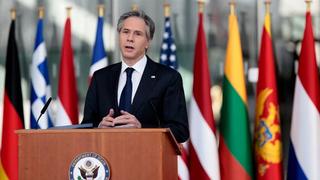
The first 100 days
- A foreign policy for the American people | On 3 March, Blinken delivered a speech titled ‘A Foreign Policy for the American People’. In this speech, he gave three ‘plans’ for American foreign policy. Firstly, to stop COVID-19 and strengthen global health security. Secondly, to turn around the economic crisis and build a more stable, inclusive global economy. And thirdly, to renew democracy.
- Repairing relationships with Europe and NATO | Blinken met with representatives from NATO and the European Commission in late March to strengthen the US transatlantic alliance around the principles of democracy and human rights. The trip was mostly considered a successful show of unity, but it did raise some points of conjecture that pose a challenge to Blinken’s diplomatic efforts. Namely, the Nord Stream 2 gas pipeline between Germany and Russia and the US icy relationship with Beijing and Moscow – key trading partners for many European nations.
- On China | Blinken’s pro-human rights posture has seen the secretary of state call out China early for its “genocide” in Xinjiang, territorialism in the South China Sea, and crackdown in Taiwan and Hong Kong. Blinken’s negotiations with China at the Anchorage Summit led the two nations to swap remarkably public criticisms of one another – sparring over each other’s nationalism, trade tariffs, cybersecurity and human rights records. Blinken insists that the US policy “goal is not to contain China, hold China back, keep China down” but to ensure that the world is led in a way that cooperatively addresses collective challenges like pandemics, climate change and disruptive technologies.
- Advancing US and democratic values | Blinken has taken a forthright stance advocating for global democratic principles including the upholding of human rights. He has condemned the escalating violence of the Myanmar military coup, attacks on citizens in Syria. He also announced humanitarian assistance for the Tigray crisis response and has lobbied President Biden to end Trump-era restrictions on refugee numbers. In a speech on US alliances, Blinken referred to China’s economic coercion of Australia as an example of China’s threats to democracy.
- Advancing climate change action | Blinken moderated the US-led Climate Summit on Earth Day in April. As part of his push for more action from countries lagging on their emissions reductions targets, Blinken’s speech at the summit tied US foreign policy interests to the development of more robust international climate efforts. In a statement on 19 April, Blinken said climate mitigation strategies offer unique opportunities to expand innovation and China is so far leading the production of climate mitigation technologies like electric vehicles, solar panels and wind turbines. According to Blinken, “if we don’t catch up, America will miss the chance to shape the world’s climate future in a way that reflects our interests and values, and we’ll lose out on countless jobs for the American people.”
The next 100: Implications for Australia
As the US relationship with Russia increasingly deteriorates – and, unlike predecessors, the Biden administration indicates no ambitions for a “reset” of US-Russian relations – there is concern that Blinken’s European expertise will draw him away from the Indo-Pacific theatre of US foreign policy. Nonetheless, Blinken will continue to emphasise the importance of cooperation with US allies into the foundations of US foreign policy, especially on emergent global issues like China’s increasing assertiveness and climate change. Therefore, Australia will work closely with the US throughout the Biden administration. When it comes to Blinken’s role as secretary of state, however, there is one significant implication. Namely, Blinken’s undeniably strong focus on humanitarian concerns and greater support for interventions may prompt Australia to consider its responsibility to protect and willingness to support US humanitarian interventions.
Kurt Campbell: National Security Council, Indo-Pacific Coordinator
The Indo-Pacific coordinator is a newly created position, charged with directing and coordinating strategy for US foreign policy in the Indo-Pacific region alongside the National Security Council.
No Senate confirmation required
“China hawks have a healthy skepticism about how the Biden administration will approach Beijing, but bringing in Kurt to play this senior role, and all the more junior, competitive-minded people who will work for him, is a very encouraging sign.” – Eric Sayers, visiting fellow at the American Enterprise Institute, a conservative US think tank.
What have they done?
- Asia czar | Kurt Campbell is referred to as America’s ‘Asia czar’, a nod to his preeminent expertise and experience determining US foreign policy strategy across the Indo-Pacific. Between 2009-13, Campbell served as assistant secretary of state for East Asia and the Pacific during the Obama administration’s defining ‘pivot to Asia’ policy. As such, Campbell has been popularly credited as the ‘architect’ of Obama’s Asia-Pacific pivot.
- On China: Building blocs | Campbell’s strategic position on China is undeniably firm and his appointment reassured nervous US allies across the Indo-Pacific who have been subject to Chinese coercive tactics. In his 2016 book, The Pivot, Campbell summarised his conviction that in response to China’s rise, the United States should be “bolstering traditional alliances, forging new partnerships, engaging regional institutions, diversifying military forces, [and] embracing economic statecraft…”.
- Trusted foreign policy expertise | Campbell’s expertise in foreign and security policy has also seen him accumulate an extensive number of associations and memberships with foreign policy research institutes. He was the co-founder and CEO of the Center for a New American Security alongside contender for Secretary of Defense and well-known China hawk, Michèle Flournoy in 2007. Among multiple other appointments and memberships, Campbell’s work in strategy development and policy advising led him to collaborate with numerous members now on Biden’s national security team including Jake Sullivan, Rush Doshi, and Ely Ratner.
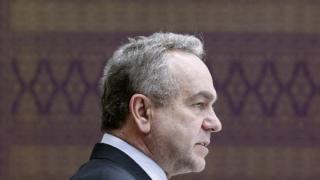
The first 100 days
- Alone in the field | Campbell’s commitment to regional partnerships was confirmed in an interview with The Sydney Morning Herald in March 2021, where he said that he would not cooperate with China until Beijing stops its ‘economic coercion’ of Australia and stated that he would not leave Australia alone in the field.
- Quad building| The multilateral approach to a more assertive China –a hallmark of both President Biden and Kurt Campbell’s view of Asia – was most clearly articulated with the unprecedented Quad summit of Japan, India, the United States and Australia on 12 March.
- On Taiwan | Ahead of President Biden’s meeting in Washington with Japanese Prime Minister Suga in April, Campbell visited Japan to spearhead agreements with Japanese representatives and prompt greater Japanese protection of Taiwan and resistance against China within the Indo-Pacific region. With Biden, Campbell encouraged Tokyo to draft its own version of the Taiwan Relations Act.
The next 100: Implications for Australia
Campbell’s appointment was widely praised by Australian foreign policymakers. He has long been considered a ‘friend of Australia’ – a phrase echoed in commentaries following his appointment. Campbell will foremostly work to redouble efforts to counterbalance China, re-assert US strategic primacy, promote liberal economic order and re-engagement in the Indo-Pacific. Rebounding from Trump’s ‘America First’ approach, Australia can expect Campbell to advance further coalition-building with the Quad and other regional partners on military deterrence, and the development of cybersecurity and technological infrastructure. After all, Campbell’s career has positioned him as the chief cheerleader for a multilateral rebuttal of China’s assertiveness.
Brian Deese: Director, National Economic Council
The director of the National Economic Council (NEC) is the president’s chief architect and coordinator of the administration’s economic policy.
No Senate confirmation required
"He'll be one of the youngest NEC directors in history, but he'll be the first who is a true expert on climate policy. If we’re going to tackle the climate challenge, we need to make sure the solutions are woven into every output of our policymaking. Getting our economic policy right from the beginning is essential” - President Biden on Brian Deese, 4 December 2020.
What have they done?
- The 2009 auto bailout | At 31, Deese found esteem as a ‘wunderkind’ for his central role in President Obama’s 2009 auto-industry bailout with an incomplete Yale law degree under his belt. According to one insider guide, Overhaul (2011), Deese’s advice was instrumental in saving Chrysler from liquidation as he voiced concerns for the ‘human stakes’ of its collapse and the cost that liquidation would bear on mid-western industrial communities.
- Under the radar | In 2011, Deese became the deputy director of the NEC, then deputy director of the Office of Management and Budget (OMB) in 2013 and acting director of OMB in 2014. At this time, he was considered one of the most powerful, but least famous people in Washington and worked on a range of economic issues including financial regulation, housing, energy and infrastructure.
- On climate | In February 2015, Deese was appointed senior advisor to President Obama. In this position, he played a central role in the Paris Agreement and directed US engagement with China and India on reduction targets. In 2016, Obama provided a glowing review of Deese: “Nobody outside the White House necessarily knows Brian… he engineered the Paris Agreement, the Hydrofluorocarbons Agreement, the Aviation Agreement, may have helped saved the planet, and he’s just doing it while he’s got two babies at home, and could not be a better person.”
- BlackRock | During the Trump administration, Deese became the global head of sustainable investing at the world’s largest investment corporation, BlackRock. While this posting earned him expertise in managing the delicate task of economic development with environmental protection, it attracted criticism from progressive politicians and climate activists who called Deese BlackRock’s chief ‘green washer’.
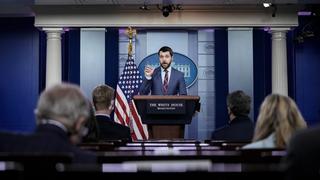
The first 100 days
- Build back greener | Deese pins climate change at the centre of all economic concerns. As such, Biden’s US$1.9 billion American Jobs Plan conceptualises economic repair as one that necessitates infrastructure for a future impaired by climate change. Deese speculated this will likely involve decarbonising the US economy, electrifying public transportation, and weatherising homes and buildings. He also advocated for a long-term orientation towards new markets and new industries into the administration’s jobs and infrastructure plans, seeking to bolster government funds with private finance.
- Domestic industrial strength | Competition with China is written into ‘Bidenomics’ in that there is an emphasis on industrial rather than market-based investments. As part of this industrial investment, Deese emphasised the lucrative investments possible in R&D and advancing US innovation, with a focus on US economic resilience and sovereign supply chains.
- Semiconductor supply chain security | In the first 100 days, one of Deese’s tasks included working alongside Secretary of Commerce Gina Raimondo to secure the United States access to semiconductor chips needed for sustainable auto production and technology productions. On 13 April, Deese attended a virtual CEO Summit on Semiconductor and Supply Chain Resilience, with Raimondo and various big tech participants including Google, Intel, HP and General Motors.
The next 100: Implications for Australia
Deese’s role as the director of NEC and the Biden administration’s tall order of post-COVID reconstruction challenges will likely see the director preoccupied with domestic recovery. The greatest omission from Deese’s ambitious first 100 days is a comprehensive position on trade policy. However, the reorientation of US economic policy from market-based stimuli to industry policy signals a potential for greater US-Australian partnership on investment and innovation. Australians should eagerly watch the development of US industrial policy to be ready to engage in these opportunities. As Deese has framed US recovery with an emphasis on environmental protection and climate change mitigation, Australian rare earth minerals required for many renewable energy technologies may become an area of interest.
Kathleen Hicks: Deputy Secretary of Defense
The deputy secretary of defense is the second-highest-ranking official in the Pentagon and is tasked with overseeing the internal and day-to-day management of the Department of Defense.
Confirmed by voice vote.
"Dr Hicks is a superb choice for this important job. She has the discipline, intellect, and organizational skill to make the Department work effectively for the Secretary. "She has a strong moral compass and a keen commitment to the success of the Department and the well-being of its military and civilian personnel. I am very pleased that President-elect Biden has selected her." – CSIS President and CEO John J. Hamre
What have they done?
- National security and defence policy | Hicks has extensive experience advising national security policy. She began her career as a civil servant in the Office of the Secretary of Defense between 1993 and 2006 and led numerous research projects as a senior fellow at the Center for Strategic International Studies from 2006-09. In 2010, Hicks received her PhD in political science titled, “Change Agents: Who Leads and Why in the Execution of US National Security Policy”. After working in the Obama administration, Hicks went on to become vice president of CSIS and the director of its international security program.
- During the Obama administration | From 2009-13, Hicks served in the Obama administration as a senior civilian official in the Department of Defense. In 2012, she was confirmed as the principal deputy under secretary of defense policy where she advised global and regional defense policy for both the Asia-Pacific and the Persian Gulf regions including in Afghanistan, Iraq, Libya and Syria.
- National Defense Strategy Commission (2018) | In 2018, Hicks co-authored Providing for the Common Defense, a congressionally commissioned review of the Trump administration’s National Defense Strategy and US defence policy more broadly. The report argued that US domestic challenges, authoritarian competitors, and increased grey-zone aggression threatened US interests and created a crisis of US national security. The authors also stressed that the United States needs more focus on “tough choices” regarding future investments, new operational concepts, technological innovation, modernised nuclear deterrence, and bleakly advised that failure to meet these make these choices will lead to a “tragedy of unforeseeable magnitude”.
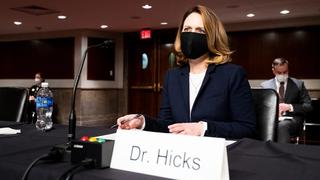
The first 100 days
- FY2022 Defense Budget | One of Hicks’ earliest moves and greatest priorities in the first hundred days was to order a review of the FY2022 Defense Budget. According to early reports, there are five areas under review including shipbuilding additions, nuclear capability, the F-35 program, long-range fires, and the KC-46A tanker and MQ-9 Reaper Drone. While the budget is usually prepared for February, Hicks has faced delays due to the presidential transition.
- On China | In her February hearing with the Senate Armed Services Committee, Hicks said China represented the greatest geopolitical challenge to the United States. Echoing much of her commentary in 2018, Hicks argued that the US military is challenged by China’s military modernisation and growth, arguing that “to deter and defeat challenges from competitors like China, the Department must increase the speed and scale of innovation in the force even as it stands ready today”. In essence, Hicks said China presents a pacing challenge for the US military where modernisation is imperative.
- Alliances and partners | Hicks spoke in favour of greater burden-sharing by US allies and partners in addressing the China challenge and has stated that alliances are the US greatest asymmetric advantage. Supportive of a federated defence agenda, she has emphasised a need for strengthened collaborative planning and reformed coordination mechanisms and decision-making processes to improve interoperability.
- Deputy’s Workforce Council | On March 11, Hicks established the Deputy’s Workforce Council to drive institutional reform efforts in regard to equity, inclusion, and diversity in the Pentagon. This included addressing transgender issues, sexual assault and harassment and extremism.
The next 100: Implications for Australia
While US public opinion and government rhetoric on China has quickly evolved in the last decade, the US Department of Defense’s budget, strategy, policies, and materiel have not fully caught up. From fortifying inter-operability with US allies to revamping US weapons platforms, a sea change in the US Defense Department is required for the era of strategic competition. In leading such monumental efforts, Hicks will be an indispensable partner of Australia and other US allies in the region. Yet such efforts do not solely require US action. Like many other aspects of a whole of government US strategy on China, Australian engagement will likely be sought by Hicks in a number of multilateral efforts.
John Kerry: US Special Presidential Envoy for Climate Change
The US special presidential envoy for climate change is a cabinet-level position serving on the National Security Council. Biden announced the role in November 2020, demonstrating his commitment to addressing climate change, as well as his view of it as a threat to national security.
No Senate Confirmation required
“I just literally cheered when I got the news about his appointment. He’s not in it for the ego or for recognition or any kind of steppingstone or personal development goal. He’s in it to try and help. Because the help is needed. It is the challenge of our time.” – Former Vice President, Al Gore, 23 November 2020.
What have they done?
- Climate czar | Biden refers to Kerry as his ‘climate czar’, referring to Kerry’s unrivalled experience working multilaterally to secure international climate agreements. As Obama’s second secretary of state from 2013-2017, in 2015 Kerry led the negotiation of the Paris Agreement among 200 countries. He additionally negotiated the Kigali Amendment to the Montreal Protocol in October 2016 and chaired the Arctic Council in 2015. Out of Washington, in 2019 Kerry formed World War Zero, a coalition to fight climate change.
- Secretary of state | In his term as secretary of state, Kerry earned himself a reputation as a level-headed ‘peacemaker’, applying a strategy of tough and patient diplomacy to many delicate foreign policy challenges. Kerry spent much of his service preoccupied with the Middle East but also oversaw the US entrance to the Trans-Pacific Partnership. One of his greatest criticisms was his more hands-off approach to the Indo-Pacific, making infrequent visits to East Asia and failing to sustain Obama’s so-called pivot to Asia.
- In the Senate | Kerry served as a Democratic senator for Massachusetts from 1985 through to 2013. He maintained an ideologically liberal voting record in the Senate, voting in favour of abortion rights, same-sex marriage, gun control measures and against capital punishment and privatising social security.
- Democratic Presidential Nominee | Kerry was the 2004 Democratic presidential nominee, making him one of the most well-known names in the Biden administration. During his presidential campaign against George W. Bush, Kerry fervently criticised the US war in Iraq, arguing that the Republicans were too distracted by foreign policy to manage unresolved domestic issues like healthcare and employment. Before entering the Senate and after his military service in Vietnam, Kerry was a well-known anti-war activist.
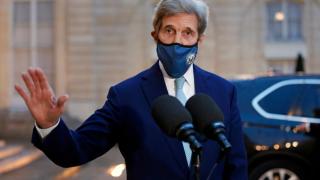
The first 100 days
- A humble re-entry | Kerry is a symbol of the Biden administration’s dedication to climate action. Marking a ‘humble re-entry’ to leading climate negotiations, Kerry was tasked with laying the groundwork for the administration’s Climate Leaders’ Summit on 22 April as he visited leaders from several heavy-emitting nations to pre-emptively raise the climate reduction ambitions of countries ahead of the meeting.
- Multilateral effort | From the moment of his appointment, Kerry said addressing climate change requires global cooperation, stating in his first remarks as envoy, “we need to all move together, because today very few are on a trajectory of the steep reductions needed to meet even current goals, let alone the targets we need to avert catastrophic damage.” Kerry’s visit to China the week before the summit highlighted his commitment to collaboration and strategy of targeting heavy-emitting nations, regardless of alliances.
- China | Amid criticism for the perception that the Obama administration prioritised climate change collaboration with China over deterring China’s aggressive foreign policy, Kerry made clear that the many issues the United States has with China – ranging from intellectual property theft to the South China Sea – “will never be traded for anything that has to do with climate. That’s not going to happen.”
- Strategies: Carbon pricing and the green taxonomy | While Kerry has consistently spoken in favour of establishing carbon pricing. However, Kerry admitted that a carbon border tax adjustment is ideally the last resort due to its implications on economies, relationships, and trade. The comments came after the EU announced plans to implement the adjustment mechanism, which Kerry insisted be postponed until after the Glasgow summit. The EU has also advised Kerry to develop an identical ‘green taxonomy’ to ensure consistent standards of green behaviours across the Atlantic.
The next 100: Implications for Australia
Biden’s appointment of a special presidential envoy for climate underlines the administration’s prioritisation of climate change in its foreign policy. As a nation with the highest per capita emissions, and, increasingly, one earning a reputation of being unsatisfactorily committed to its climate targets, Australia should prepare for increased rhetorical pressure to adopt more ambitious targets. This was made clear at the summit on 22 April 2021. Kerry has flagged that the United States and Australia have some ‘differences when it comes to climate ambitions, especially surrounding coal-fired power plants which Kerry insists will lead to catastrophe.
Ron Klain: White House Chief of Staff
The White House chief of staff is a highly influential role, setting the president’s agenda, overseeing all policy developments and managing the daily operations for the White House.
No Senate confirmation required
“Ron has been invaluable to me over the many years that we have worked together, including as we rescued the American economy from one of the worst downturns in our history in 2009 and later overcame a daunting public health emergency in 2014.
His deep, varied experience and capacity to work with people all across the political spectrum is precisely what I need in a White House chief of staff as we confront this moment of crisis and bring our country together again.” – President Biden, 12 November 2020.
What have they done?
- Biden connections | Klain’s connection to Biden began with Biden’s 1987 presidential campaign and later his role as chief counsel to the Senate judiciary committee while Biden chaired the committee in 1989. Klain then went on to become then-Vice President Biden’s chief of staff between 2009 and 2011 and helped him to prepare for presidential debates in 2020. Klain was Biden’s first staff member announced by the new administration.
- Economic recovery | As Chief of Staff to then-Vice President Biden, Klain oversaw one of Biden’s most notable efforts: the passing of the contentious US$838 billion government stimulus package - the American Recovery and Reinvestment Act in 2009 – as well as the oversight of the government-funded efforts which included more than 100,000 projects and 275 programs across 28 federal agencies.
- Ebola czar | During the Ebola outbreak from 2014-15, Klain served as the Obama administration’s Ebola response coordinator. Klain received high praise for his problem-solving skills and bureaucratic prowess, coordinating the US Ebola response across multiple agencies and directing assistance to West Africa to contain the epidemic at the root.
- Washington insider | Klain has worked behind the scenes for several Democratic presidential nominees, working as a presidential debate coach for Bill Clinton in 1992 and 1996, Al Gore in 2000, John Kerry in 2004, Barack Obama in 2008, Hillary Clinton in 2016 and Joe Biden in 2020. During his time serving the Clinton administration, Klain oversaw the judicial nomination of Ruth Bader Ginsburg in 1993 before working as chief of staff and counselor to Attorney General Janet Reno in 1995 and then as chief of staff to Vice President Al Gore from 1995 to 1999.
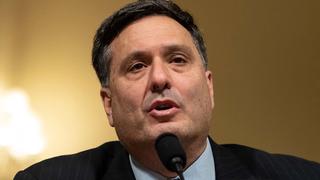
The first 100 days
- Pandemic response | Many of the Biden administration’s early efforts to control the coronavirus pandemic in the National Strategy for the COVID-19 Response and Pandemic Preparedness bear the hallmarks of policy advice Klain espoused during his term as White House Ebola response coordinator and in his criticism of Trump’s pandemic response in 2020. This includes policies such as the Biden administration’s federal mask mandate on 20 January 2021 and the administration’s goal of 100 million COVID-19 vaccination shots in the first 100 days.
- Keeping the Left in line | Klain admitted in 2020 that he is more progressive than Joe Biden but, nonetheless, saw Biden as someone capable of implementing real progressive change. Klain giving voice to more progressive politicians proved instrumental in minimising criticism of the Biden administration from the left-wing of the Democratic Party.
- Negotiating the jobs and infrastructure plan | Klain’s flair for negotiation was put to the test as he sought to navigate the passage of the administration’s contentious jobs and infrastructure plan with bipartisan backing. Commentators reflected that Klain’s experience during the 2009 stimulus delivery is responsible for his ‘lightning rod’ approach to Republican opposition and reflects his learning of an important lesson: “don’t spend months pursuing Republican votes and don’t wait to start selling it to the public.”
The next 100: Implications for Australia
As chief of staff, Klain will continue to focus on the operations of the White House and smoothing the passage of significant domestic legislation. Unlike some predecessors, he is significantly less internationally oriented. This is both a reflection of the tall order of domestic policy challenges facing the United States and of his personal aptitude and experience handling domestic duties rather than foreign policy. Of those domestic concerns, he will likely be tasked with continuing pandemic recovery (including the rollout of more vaccines), bringing debates about the filibuster back to the discussion table and the voting rights bill. Nonetheless, Klain’s bureaucratic prowess signals that the White House is returning to higher functionality. Allies like Australia can expect the White House to be more predictable and orderly than in previous years.
Gina Raimondo: Secretary of Commerce
The secretary of commerce reports to the president on matters of commerce and promotes US industries both domestically and overseas. The Commerce Department’s duties include weather forecasting, the census, ocean fisheries and setting international product standards, as well as advising on trade policy.
Confirmed by Senate 84-15
“She is known as an effective and innovative executive whose strong management brought her state back from what was, at the time she first ran for governor, the worst unemployment rate of any state in the nation. A champion of creative, forward-thinking economic initiatives, Governor Raimondo launched successful workforce training programs to prepare Americans for the 21st century economy…” – President Biden, 7 January 2021.
What have they done?
- Governor of Rhode Island | Before her appointment to the Biden administration, Raimondo served as governor of Rhode Island from 2015-21. During this time, she passed significant economic reforms, including record investments in infrastructure, education and employment. Under her leadership, Rhode Island successfully reduced unemployment (Rhode Island had the highest rate of state unemployment in 2014), implemented tax cuts, increased the minimum wage, and established sick-leave entitlements and tuition-free community college.
- General treasurer of Rhode Island | Raimondo began her political career as general treasurer of Rhode Island in 2011. Her foremost legacy during this appointment was her reform of the public-employee pension through the Rhode Island Retirement Security Act. While the Act received bipartisan support in both chambers, the pension fund received criticism for underperformance and for playing into the pockets of hedge fund managers. Notably, this early move in her career gained her significant support among conservatives and financiers in Wall Street.
- Family first | Raimondo often emphasises her family roots in her politics, often referring to her upbringing in a tight-knit Italian American family for her commitment to core beliefs in hard work and opportunity. She consistently highlighted the importance of financial security and employment, a position motivated by her experience of financial insecurity as a child when her father lost his job in meat processing when the company moved overseas.
- Approval ratings as governor | As governor, Raimondo enjoyed economic growth in her state as well as career success, including serving as the head of the Democratic Governors Association in 2019. Yet throughout her run in office, Raimondo consistently ranked towards the bottom of approval ratings for US state governors. Towards the end of her term, Rhode Island’s economy had been severely hit by the coronavirus pandemic, with Rhode Island having one of the highest per capita infection rates of all US states. Some progressive Democrats also criticised her appointment to the Biden administration, referring to Raimondo as a ‘corporate insider’ with an insufficient understanding of the technology sector – an important area for investment and competition with China.
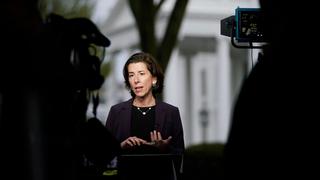
The first 100 days
- Biden’s ‘jobs cabinet’ and the corporate tax rate | As Biden continues to seek funding for his over US$2 trillion infrastructure bill, Raimondo holds an important role in creating support for corporate tax increases and communicating the financial terms of the proposal to the public. Raimondo joined Transportation Secretary Pete Buttigieg, Energy Secretary Jennifer Granholm, HUDS Secretary Marcia Fudge and Labour Secretary Marty Walsh as part of Biden’s ‘jobs cabinet’ tasked with persuading the public of Biden’s infrastructure plan. While Biden initially proposed a corporate tax increase to 28 per cent from the current 21 per cent, Raimondo echoed Biden, arguing that there is room for compromise on the tax proposal and encouraged businesses to be cooperative.
- The economic fight with China | As Secretary of Commerce, Raimondo holds an important role in determining US trade policy. Raimondo was tasked with promoting the ‘Made in America’ strategy and providing grants to strategically important American businesses. Raimondo said that she intends to aggressively push back against China. According to Raimondo, US efforts to regulate Chinese technology firms like Huawei and Byte Dance are key areas of concern.
- Semi-conductor R&D | Raimondo advocated for Biden’s proposed US$50 billion investment in semi-conductor manufacturing and research. This signals the US attempt to strengthen its sovereign manufacturing capabilities and to secure its access to technologies – an area of weakness exposed by the pandemic. Raimondo said semiconductors are “the building blocks of a future economy and a digital economy”.
- Sustainable economic development | Raimondo, among others in Biden’s cabinet, helped launch an initiative to expand offshore wind power in March in an effort to boost the US clean energy resources as well as stimulate job growth.
The next 100: Implications for Australia
Raimondo’s predecessor from the Trump administration, Wilbur Ross, held a defining role in US trade policy with China. Yet Raimondo’s specific strategy towards trade with China – aside from expressing an intention to “aggressively push back against China" - remains unclear. Raimondo will be largely responsible for determining priorities in US trade including highlighting key industries for investment. As renewable technologies come to the fore, this may represent an opportunity for greater Australian engagement in renewable oriented R&D and the trade of rare earth minerals.
Ely Ratner: Special Advisor to the Defense Secretary and China Task Force Director / Assistant Secretary of Defense for Indo-Pacific Security Affairs (nominated)
The Assistant Secretary of Defense for Indo-Pacific Security Affairs is the foremost advisor on security and strategy policy in the Indo-Pacific region for the Pentagon.
No Senate confirmation required for Special Advisor role, still pending confirmation for Assistant Secretary role
“Ely is one of the best in Washington on Asia policy and the US-China relationship. This pick is a good sign for anyone who wants to see the Biden team take a more competitive approach toward Beijing. The Pentagon will be lucky to have his talents as it continues to make China its top priority and find ways to network with Asian allies together on security issues.” – Eric Sayers, visiting fellow at the American Enterprise Institute
What have they done?
- In Washington alongside Biden | Ratner’s extensive Washington experience included working alongside Biden in multiple roles throughout his career. Their work together began when Ratner served as a professional staff member from 2001-03 on the Senate of Foreign Relations Committee which Biden chaired. Ratner also worked on then-Senator Biden’s professional staff. He later worked during the Obama administration in the State Department’s Office of Chinese and Mongolian affairs from 2011-12, before being appointed as deputy national security advisor for then-Vice President Biden from 2015-17. Ratner co-led the Biden campaign’s East Asia Working Group and was a member of the Biden transition’s Department of Defence Review Team.
- US-China strategy expert | A widely known and respected as an expert on US-China relations, Ratner has published widely on US national security strategy in Asia and maritime disputes across the Indo-Pacific across numerous foreign policy mastheads. In 2020, he testified before the Senate Foreign Relations Committee for a congressionally mandated assessment of US strategy towards China. His widely cited report presented China as America’s strategic rival and promotes greater investment in securing technological advantages, and US global leadership.
- Known to the region as a strategic hawk | The foreign policy establishments of Indo-Pacific allies and partners of the United States, including Australia, know Ratner well. Many see him as a “China hawk” who will seek to build upon the more constructive aspects of the Trump administration’s policies in Asia – such as coalition building and increasing domestic competitiveness – while avoiding the more destabilising features – such as minimizing the role of US values in foreign policy.
- Rising to the China challenge | Ratner has worked at a number of Washington’s leading think tanks and organisations, most recently as the executive vice-president and director of studies at the Centre for New American Security (CNAS) as well as an advisor at Antony Blinken and Michelle Flournoy’s WestExec Advisors consulting firm. At CNAS, Ratner co-authored a congressionally mandated report, Rising to the China Challenge, which is serving somewhat as a Biden administration blueprint for pursuing competition with China. The report calls for strategic competition with China to be viewed as an urgent priority and advocates for improved US military technologies and deterrence as well as diplomacy.

The first 100 days
- The Asia-hand for a SecDef lacking Asia experience | With Secretary of Defense Lloyd Austin’s minimal experience in the Indo-Pacific region, Ratner was appointed to be “Special Assistant to the Secretary of Defense”, a role that did not require Senate confirmation but allowed Ratner to immediately hold an influential role in the Defence Department. Ratner will maintain this role while he awaits Senate confirmation for Assistant Secretary of Defense for Indo-Pacific Security Affairs, a new role he was nominated for in April.
- Reviewing Pentagon policy | Soon after his joining the Defense Department, Ratner initiated an extensive ‘sprint’ effort to review US Defense policy on Beijing. Ratner explained that across multiple administrations, the Defense Department saw “a proliferation of policies, activities and initiatives” related to the “China challenge” so the review will seek to make the efforts “synchronized, prioritized, and coordinated” across both the department and Indo-Pacific region.
The next 100: Implications for Australia
Defense Secretary Lloyd Austin’s inexperience in China matters is often considered his foremost weakness. As such, Ratner’s China expertise and appointment as Austin’s primary China advisor is seen as a reassuring sign for both US defence policy and allies across the Pacific. Ratner joins a burgeoning team of widely-respected China experts across the Biden administration, who collectively espouse a perspective that US-China strategy must coordinate efforts both domestic and international efforts to compete with China – or in other terms, are “China hawks”. Yet unlike many of the “China hawks” in the Trump administration, Ratner is acutely cognisant of the values of US alliances as well as the interests and perspectives of US allies.
Cecilia E. Rouse: Chair of the Council of Economic Advisors
The Council of Economic Advisors provides the president with economic advice on both domestic and international policy, analyses economic developments and trends and recommends economic policies that benefit the United States.
Confirmed by Senate 95-4
“[Rouse is] one of the most distinguished economists in the country; an expert on labor economics, race, poverty and education” – President Biden, 1 December 2020
What have they done?
- Washington experience | Rouse served as a member of President Obama’s Council of Economic Advisors from 2009 to 2011. During this time, she designed economic policies to boost employment and petitioned for greater fiscal stimulus in response to the 2008 Global Financial Crisis. She also served as a special assistant to President Clinton in the National Economic Council between 1998-99. Rouse was previously the Dean of Princeton University’s School of Public International Affairs and was the second-longest serving dean in the school’s history.
- The economics of education and labour policy | In her time in academia, Rouse’s research concentrated on federal economic policy with a particular focus on labour and education. She published widely on the benefit of community college attendance, sex discrimination in the workforce, and the effects of student loan debt.
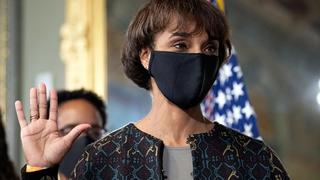
The first 100 days
- The care economy | As part of Biden’s infrastructure plan, Rouse will guide the rehabilitation of America’s labour market. So far, she has concentrated on women’s participation in the workforce, pushing for a US$25 billion spend on the development of new childcare centres.
- What is infrastructure? | Rouse is vocal about the need to update and expand the definition of infrastructure. Rouse argues ‘infrastructure’ includes structures that maximise economic activity and should include the incentivisation of electric vehicles and greener technologies. In an interview with CBS’ Face the Nation on 4 April, she said, “It is important that we upgrade our definition of infrastructure, one that meets the needs of a 21st-century economy, and that means we need to be funding and incentivising those structures that allow us to maximise our economic activity.”
The next 100: Implications for Australia
As chair of CEA, Rouse will be instrumental in shaping the conceptualisation of and approach to economic policy as well as the definition of economic success. In the days following her nomination, Rouse said the pandemic provides “an opportunity to build a better economy in its wake”. Certainly, Rouse’s expertise in education, long-term employment, and race and sex discrimination will etch the new parameters of this new post-COVID economy to one that pins reducing inequalities at the centre.
Wendy Sherman: Deputy Secretary of State
The deputy secretary of state assists the secretary of state on all aspects of foreign policy.
Confirmed by Senate 56-42
“She is both extraordinarily focused and extraordinarily tenacious…She’s not the kind to pay attention to pain.”
– Secretary of State Antony Blinken in November 2013, after it emerged that Sherman fell and ruptured a tendon in her finger on her way to do a briefing on Iran – only after which she went to the emergency room.
What have they done?
- Iran Nuclear Deal | Between 2011 and 2015, Sherman served as undersecretary for political affairs in the Obama administration; a role that secured her the National Security Medal. In this role, Sherman led US negotiation for the Iran Nuclear Deal alongside a team that included other future Biden administration cabinet members, Antony Blinken and Jake Sullivan. Her efforts helped secure the agreement as she argued to remove US sanctions on Iran in exchange for a sharp Iranian curtailment on its nuclear development program.
- North Korea Nuclear Deal | In 1994, Sherman was appointed to negotiate a nuclear deal with North Korea. Her negotiations saw North Korea agree to freeze and dismantle its nuclear weapons program – which prevented North Korea from stocking any plutonium during the Clinton administration – and agree to not produce, test or deploy missiles within a range of more than 300 miles in 2001. Sherman has since received criticism for failing to secure North Korea’s long term compliance with the terms of the agreement.
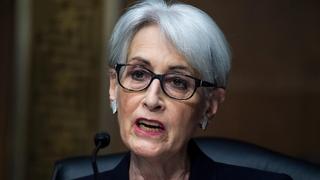
The first 100 days
NB: Sherman was confirmed on April 14, 2021.
- Iran nuclear talks | With the indirect US-Iranian renegotiation of the Joint Comprehensive Plan of Action (JCPOA) in Vienna beginning in early April, Sherman’s expertise on Iran and nuclear negotiations are vital in ensuring all Iran nuclear negotiations align with US interests. In her Senate hearing, Sherman advocated for a renewed approach to the deal, stating negotiations must “be decided on the merits of where we are today, not nostalgia for what might have been.” She has a crucial role in efforts to reconstruct the agreement and wrangle bipartisan support on US strategy towards Iran.
- Denuclearising North Korea | At her confirmation hearing before the Senate Foreign Relations Committee on 31 March, Sherman emphasised the need for the United States to work towards North Korean denuclearisation. Key to this, Sherman stressed the role of regional power dynamics and the way US negotiations with North Korea will inevitably implicate China.
The next 100: Implications for Australia
Sherman will play an important role in pursuing Middle Eastern stability. A stable Middle East is certainly within the interests of Australia, as it will allow the United States to become more engaged in the Indo-Pacific, where Australia seeks further resources and support for countering an increasingly assertive China.
Jake Sullivan: National Security Advisor (NSA)
The national security advisor is the senior aid to the president on matters of national security. The role is tasked with coordinating and advising the Cabinet on security, intelligence, defence and foreign policy. The NSA is positioned front-and-centre of US foreign policy decision making.
No Senate confirmation required
“He is once in a generation intellect with experience and temperament for one of the toughest jobs in the world… Jake understands my vision, that economic security is national security, and it helps steer what I call a foreign policy for the middle class, for families like his growing up in Minnesota, where he was raised by parents who were educators, and taught him the values of hard work, decency, service and respect.” – President Joe Biden, 24 November 2020.
What have they done?
- On the campaign trail | Sullivan’s White House experience resembles that of someone significantly older, being the youngest ever NSA. In 2008, Sullivan was an advisor to Hillary Clinton during the Democratic primaries and then for Obama for the general election. Leading up to the 2016 presidential election, Sullivan worked as the senior policy advisor to Clinton’s campaign and featured prominently in the leaked Podesta emails published by WikiLeaks. In this role, Sullivan recognised Trump’s ability to appeal to disgruntled middle-class Americans as a unique advantage.
- During the Obama administration | During the Obama administration, Sullivan worked as deputy chief of staff in 2009, travelling to 112 countries with Secretary Clinton as the (youngest-ever) director of the State Department’s Policy Planning between 2011-13. In 2013, Sullivan became then-Vice President Biden’s top foreign policy aid and worked on US security policy in Libya, Syria and Myanmar.
- Foreign policy for the middle class | Following the election of Donald Trump, Sullivan became known for championing Biden’s belief in ‘foreign policy for the middle class.' In 2018-2020, Sullivan co-authored a series of reports US Foreign Policy for the Middle Class for the Carnegie Endowment for International Peace. The reports contend US foreign policy and domestic policy are iteratively linked and foreign policymakers must consider how their decisions will affect the American middle class.
- The Iran Nuclear Deal | Between 2013 and 2015, Sullivan and Biden led secret negotiations with Iranian officials, which eventually paved the way for the 2015 Joint Comprehensive Plan of Action (JCPOA). Upon his appointment, Sullivan described re-negotiation with Iran as a critical early priority.
- Criticisms of Trump | In his years between government service, Sullivan published series of commentaries, articles and essays through various outlets and research institutes that were highly critical of former President Trump’s approach to foreign policy. He criticised the withdrawal from the Paris Agreement, isolationism, the administration’s trade relationship with China and approach to Iran nuclear sanctions. Sullivan also wrote more generally on the state of world affairs. In 2018, Sullivan highlighted what he considered to be chief threats to US foreign policy interests: The rise of authoritarian regimes and the demise of international multilateral cooperation featured prominently.
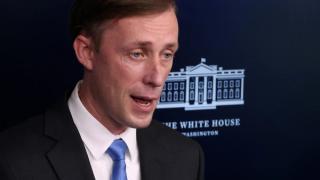
The first 100 days
- Dealing with China | At the US-China Anchorage summit in March, Sullivan made it clear that he intends to hold China to account in terms of its human rights violations in Xinjiang, Tibet, Taiwan and Hong Kong. This signals Sullivan’s and the Biden administration’s commitment to rehabilitating the image of America as a democratic world leader seeking to restore its alliances across the Indo-Pacific. Concurrently, he has consistently reported the United States is open to negotiation and cooperation with China in an effort to bring about more global stability.
- Withdrawing from Afghanistan | With President Biden’s announcement that he would withdraw US troops from Afghanistan by 11 September 2021, Sullivan will also have an important role in coordinating and overseeing the security challenges involved in another US withdrawal from the Middle East. Biden’s rationale for the withdrawal – namely, that it does not serve the interests of middle-class Americans – resonates with Sullivan’s principle of foreign policy for the middle class.
- Renegotiating with Iran | Sullivan’s experience leading the negotiation of the Iran Nuclear Deal puts him in an important position to renegotiate the agreement (after Trump’s 2018 withdrawal) and encourage Iran’s compliance with the agreement’s terms. On 12 March, Sullivan said communications between Iran and the United States had begun focusing on a ‘compliance for compliance approach’. In April 2021, the meetings in Vienna seeking to rehabilitate the agreement began under the direction of US special presidential envoy for Iran, Rob Malley.
- Dealing with Russia | In April, the United States proposed economic sanctions against Russia and expelled 10 Russian diplomats in retaliation for the SolarWinds hacking. Further, in an 18 April interview, Sullivan asserted that the “there will be consequences” if Alexi Navalny, a critic of Putin, dies after being imprisoned in Russia.
The next 100: Implications for Australia
Sullivan will advance and centralise the administration’s three top priorities – China, climate change and coronavirus recovery – in the objectives and activities of the government’s national security bodies. As has been the case so far, these priorities will likely take on important symbolic meanings elevating US values. This will see the United States seek to re-establish itself as a trusted democratic leader on the global stage through alliance-building, increased global engagement and gestures which infer a commitment to the rule of law and human rights. For Australia, this could mean more stern attempts to coax us into more ambitious emissions reduction targets and could open opportunities to become more bravely critical of human rights abuses and international rights violations.
Early on, Sullivan applauded Australia’s efforts to uphold democracy, tweeting on 3 December, “The Australian people have made great sacrifices to protect freedom and democracy around the world. As we have for a century, America will stand shoulder to shoulder with our ally Australia and rally fellow democracies to advance our shared security, prosperity and values.” Not only does this demonstrate the NSA’s commitment to upholding democracy as the core of the US values-based foreign policy, but also shows a commitment to working closely with allies like Australia.
However, with Sullivan at the helm, Australia should be aware and prepared for US interests (distinct from values) to be determined by the temperature of the US domestic repair. This is a gesture of the foreign policy of the middle class – where foreign and domestic policy merge. If foreign policies like trade are influenced by domestic policy, then Australia should look to engage with the US investment in renewable R&D as it enhances its public infrastructure.
Katherine Tai: United States Trade Representative (USTR)
The USTR develops and coordinates US international trade policy, oversees the enforcement of trade agreements, and is the national spokesperson on trade issues, including commodity and direct investment policy.
Unanimously confirmed by Senate 98-0
“She will be an essential player in restoring America’s credibility with our trading partners and promoting international cooperation to tackle some of the world’s biggest problems, from the global pandemic to climate change” – Senate Majority Leader Charles Schumer, 17 March 2020
“Anyone that thinks that Katherine Tai is going to be a pushover or easy on China is in for a surprise... she is certainly the most qualified person on China to have come along in that office in recent memory. She knows the issues inside out. She knows China inside out. And as a result, there will be no wool pulled over her eyes by anybody.” - Doug Barry, a spokesperson for the US-China Business Council, in January 2021
What have they done?
- Expert on trade with China | Katherine Tai has unmatched expertise in US-Chinese trade policy. Tai worked in the Obama administration USTR office as chief counsel for China trade enforcement (2011-14). She also served as the trade counsel at the Ways and Means Committee (2014-17) where she litigated Washington’s disputes against Beijing at the World Trade Organization (WTO). After completing her undergraduate degree from Yale in 1996, Tai taught English at the Zhongshan University in Guangzhou and is fluent in Mandarin.
- US-Canada-Mexico Agreement | As chief trade counsel for the Ways and Means Committee in 2017, Tai was a vital advocate for stronger labour provisions in the revamped North American Free Trade Agreement (NAFTA), the US-Mexico-Canada Agreement (USCMA). Tai holds that trade policy should be worker-centred and benefit US communities and workers.
- Unanimous Senate confirmation | Compared to her prolific colleagues in the cabinet, little is known of Tai’s personal opinions regarding US trade policy and politics and personal life more generally. Credited widely for being ‘reasonable’, Tai is generally well-respected on both sides of politics and from labour and business. Much of this favour is likely owing to her firm hand on trade with China, which typically unites otherwise fractured US politics. This stance earned her unanimous confirmation by the Senate on March 17.
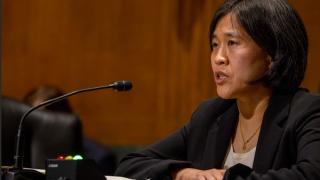
The first 100 days
- Climate change and global trade | On 15 April, Tai gave her first official speech about her vision for the future of US trade policy and the implications of climate change on global trade took centre stage. Tai criticised the multilateral trading system for penalising countries with higher environmental standards, and promoted a trading system that supports emissions reductions stating, “for too long, traditional trade community has resisted the view that trade policy is a legitimate tool in helping to solve the climate crisis”.
- Tough on China | Tai also resisted pressure to lift tariffs that the Trump administration placed on China, arguing that they are leverage to ensure China complies with terms of the 2020 accord to end the trade war. The agreement included greater purchasing of US goods and better protections for US intellectual property. In reference to the use of forced labour in Xinjiang, Tai stated that “the use of forced labour is probably the crudest example of the race to the bottom in global trade”.
- Intellectual property and securing vaccines | On 23 April, progressive Democrats called on Tai to accelerate a request of the World Trade Organization to improve global access to COVID-19 vaccines. While Tai condemned unequal global vaccine provision as unacceptable, she stated that the US is yet to clarify its position on whether it will support waiving vaccine intellectual property rights to expand access for developing countries. Beyond vaccines, intellectual property remains an important sticking point in US trade policy, particularly in regards to protecting the intellectual property of US firms from being stolen by Chinese entities.
- Enforcement over new deals | Amid extensive questioning by members of Congress, Tai made clear that establishing new trade agreements – including potentially a digital trade agreement with Australia – is simply not a top priority for her or the administration. Instead, Tai and the administration both made clear that enforcement of existing trade agreements is the priority.
- Digital services taxes | In late March, Tai confronted Austria, Britain, India, Italy, Spain and Turkey for their imposition of in-country digital services taxes on US digital service platforms like Facebook, Google and Amazon. She said her office would proceed with steps to impose tariffs and public notices, despite Biden’s push for greater global cooperation on a digital services tax at the OECD.
- Myanmar | Tai has made her dedication to retore the image of the United States as the leader of global democracy clear when she suspended the 2013 Trade and Investment Agreement with Myanmar on 29 March, in retaliation of the Myanmar coup associated with acute human rights concerns
The next 100: Implications for Australia
Tai’s unflinching approach to trade with China has significant implications for Australia. Tai’s China expertise highlights that the Biden administration is seeking a uniquely China-focused and labour-focused trade agenda. Her hesitance to withdraw tariffs on Chinese imports and keenness to work on enforcing the existing trade agreement with China could negatively impact Australian industries, as the US-China agreement requires China to boost its imports of US goods and would subsequently see decreased reliance on Australian exports. However, evidenced throughout the pandemic, the United States (as with many other nations) has become aware of supply chain vulnerabilities. In response, future US trade policy may look to diversify its supply chains, opening opportunities for deepened US-Australian economic engagement. Tai’s unclear position on US re-entry to the revamped Trans-Pacific Partnership (TPP) is one example that suggests establishing new trade agreements is not an early priority of the Biden administration.
Linda Thomas-Greenfield: US Ambassador to the United Nations
The US ambassador to the United Nations communicates the US position on major humanitarian, peace and security issues at the UN Security Council and UN official meetings.
Confirmed by Senate 78-20
“In contrast to former U.S. envoys to the U.N., from Jeane Kirkpatrick to Richard Holbrooke, who sought to leave their own personal imprint on U.S. foreign policy, Thomas-Greenfield is viewed as a loyal soldier who will carry out the president’s policy” - Foreign Policy magazine 5 February 2021
What have they done?
- US-African relations | Thomas-Greenfield has a decorated foreign service career. After joining the Foreign Service in 1982, she served in Jamaica, Nigeria, Gambia, Kenya, Pakistan and Switzerland. Between 2008 and 2012, she worked on a range of complex humanitarian and post-conflict peacekeeping issues in Liberia, before being appointed assistant secretary for the Bureau of African Affairs in the US State Department in 2013, a position she held until 2017. During this time, Thomas-Greenfield was instrumental in the US response to the West Africa Ebola outbreak during the Obama administration, and skilfully led the department’s disparate 70,000-strong workforce.
- Gumbo diplomacy| After joining the Foreign Service, Thomas-Greenfield was sent to Rwanda in 1994. During her posting, she was mistaken for the acting prime minister, a Tutsi woman, and almost assassinated by anti-government militia. In her recollection, the ambassador says she survived by establishing a personal connection with her captor, “I used the power of kindness and compassion” she said in a 2018 TED Talk. She credits this experience for her unique approach to diplomacy, what she calls ‘gumbo diplomacy’, which prioritises relationship building, recognising shared humanity over cultural difference and promoting respect.
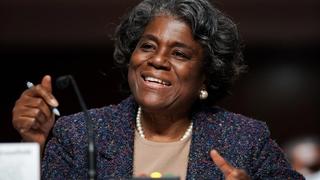
The first 100 days
- Soft power repair | Above all, Thomas-Greenfield has been tasked with US diplomacy repair, which she described to Foreign Affairs as “badly broken” due to Trump’s gutting of the Foreign Service during his administration, and the United States’ owing of over US$1 billion for UN peacekeeping. As strategic competition with China continues to be coloured by ideological difference, US presence in international institutions, like the United Nations, is increasingly important. During her Senate confirmation hearing in January 2021, Thomas-Greenfield referred to China as the United States' “strategic adversary” and warned that US absence in multilateral institutions designed to maintain peace and the rule-of-law enabled China to dominate global institutions and recreate ‘rules’ in its autocratic image.
- Holding China to account | Despite some early concerns among US senators that Thomas-Greenfield would be soft on China, so far she has delivered on her intention to encourage Beijing to change its ‘concerning’ behaviours. Such efforts were evident on 19 March at the UN General Assembly Commemorative Meeting for the International Day for the Elimination of Racial Discrimination. The ambassador called out China for its “genocide and crimes against humanity against Uighurs and members of other ethnic and religious minority groups in Xinjiang.” Her comments sparked a backlash by Chinese officials who refuted the accusation of genocide and accused the United States of hypocrisy.
- America’s original sin | Thomas-Greenfield also used her UN perch to reflect on her own experiences of racial discrimination growing up in segregated Louisiana, as well as US shortcomings addressing racialised violence, white supremacy and rising hate crimes. Her comments drew significant criticism from US conservative figures, being particularly notable due to the convention that diplomats tend towards self-praise and skirt confronting the flaws of their own nations.
The next 100: Implications for Australia
Linda Thomas-Greenfield is the embodiment of US revamped diplomatic effort. Her calm and assured approach to US diplomacy at the highest levels will be a significant shift from the Trump administration’s more bombastic role in the UN. This should come as a relief for Australia as unilateral criticisms of China’s human rights abuses, cyberattacks and territorialism in the South China Sea, have fuelled souring bilateral relations with China.
Further distinguishing her is the fact that unlike other US representatives to the UN, Thomas-Greenfield is not using her role as a platform to run for president or bolster her political accomplishments. She is, first and foremost, a longtime foreign service officer who will not veer off message or draw unnecessary attention to herself.
Janet Yellen: Secretary of Treasury
The secretary of treasury advises on economic policy and the financial system. The Treasury is additionally responsible for collecting taxes, supervising banks and printing money.
Confirmed by Senate 84-15
“Chair Yellen is an exceptional economist who has a rare gift- she can take complicated economic theories and put them into understandable language, all while showing real heart for the millions of Americans who are hurting...” – Senator Ron Wyden, 25 January 2021.
What have they done?
- Service to federal economic bodies | Yellen undertook terms at the Federal Reserve Board of Governors as an economist from 1977-78 and governor from 1994-97. She also chaired the Council of Economic Advisors (CEA) during the Clinton administration between 1997-99 where she was unanimously nominated by the Senate, served as vice chair of the Board of Governors for the Fed between 2010-2014 and chair of the board from 2014 to her succession by Jerome Powell in 2018.
- Yellen’s reputation | Throughout her appointments, Yellen earned herself a reputation for being exceptionally deliberate and well-prepared. During her appointments at the Fed, she was also known for asking probing questions in terms of market predictability and forecasts.
- Working both sides | Yellen has also been praised for her ability to build consensus with people on both sides of the aisle and being agreeable to work with. Before being appointed as vice chair by President Obama in 2010, Yellen acquired praise for being detached from politics. Equally, she has been described as having a firm hand when it comes to Wall Street and self-regulation.
- During Trump | In 2018, despite solid economic outcomes, Trump chose not to reappoint Yellen as chair of the Federal Reserve, with rumours suggesting it was in part because she was ‘too short’. Serving in the Fed since 2014, Yellen was noted to have a ‘near perfect’ record overseeing the biggest drop in unemployment of any Fed chair – from 6.7 per cent to 4.1 per cent - and guiding the stock market’s record rise.
- Keynesian economics | Yellen’s ‘saltwater’ economic approach is evident throughout her writing and her emphasis on economic stimulus, unemployment, inequality and tighter financial regulation. This economic orientation was one of the key concerns of her opposers when she was nominated to the Fed in 2014. Yellen’s most well-known papers have focused on fair wages and unemployment. She is also famously dovish on inflation.
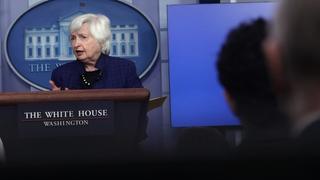
The first 100 days
- Carbon pricing | Yellen’s experience working on market-led solutions to climate policy began her term as CEA during President Clinton’s negotiation of the Kyoto Protocols. Like in 1997, it is likely this will take the form of carbon pricing and incentivisation schemes to transition the US economy away from fossil fuel dependency. During her confirmation hearing, Yellen said that she supported carbon pricing, and on 17 March, Yellen issued a Treasury statement that stressed she “is committed to using the full power of the US federal government to address climate change as part of the Build Back Better Plan.”
- Global minimum tax rate | On 5 April, Yellen proposed for foreign governments to support US efforts establishing a global minimum corporate tax rate to “make sure the global economy thrives based on a more level playing field in the taxation of multinational corporations”. While the implementation of a global minimum tax rate was floated by the OECD, support for Yellen’s proposal was mixed.
- Returning to full employment | In her 2021 confirmations before Congress, Yellen emphasised the urgent need for economic stimulus to buoy the impact of the coronavirus on unemployment figures. In early February, Yellen described the United States as in a ‘deep hole’ with more than 779,000 unemployment claims filed in one week. She has since shared her aspiration to return to full employment by 2022 and defended Biden’s infrastructure plan as playing a crucial role in boosting job demand and creation.
- Monitoring inflation | Amid the proposed rollout of Biden’s expensive and expansive US$6 trillion legislative agenda, Yellen directly addressed concerns about the risk of inflation, stating she is confident in the Treasury’s ability to monitor and manage the risk. The risk of inflation remains a major criticism of the Biden administration’s infrastructure plan by Republicans.
The next 100: Implications for Australia
Under Yellen, the US Treasury is geared towards funding climate adaptation and mitigation strategies, as well as coping with the COVID-19 pandemic recovery. After her dismissal from the Fed by President Trump in 2018, Yellen was critical of Trump’s protectionism, his withdrawal from international institutions and tariffs on China. While Yellen has long maintained a clear commitment to open trade and a liberal international trading system, she delayed reforming the tariffs imposed on China by the Trump administration. Her stance on China remains unclear though she has previously expressed concerns over Chinese industrial practice particularly in relation to working rights, intellectual property rights and market competition.
Australian Treasurer, Josh Frydenberg, welcomed Yellen’s proposal for a minimum tax rate on multinational corporations on 5 April. However, as the secretary continues to promote schemes such as carbon pricing, the two treasurers may find less agreement on other aspects of economic policy. Nonetheless, Yellen has stressed the importance of the US-Australian alliance in mutual recovery from the coronavirus pandemic and shared priorities in the Indo-Pacific. She also made clear that as the US protectionism under the Trump era had impacts on financial trends worldwide, so too will the US openness to future trade impact Australia’s own economic circumstance.





